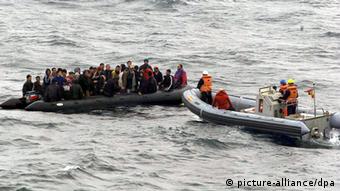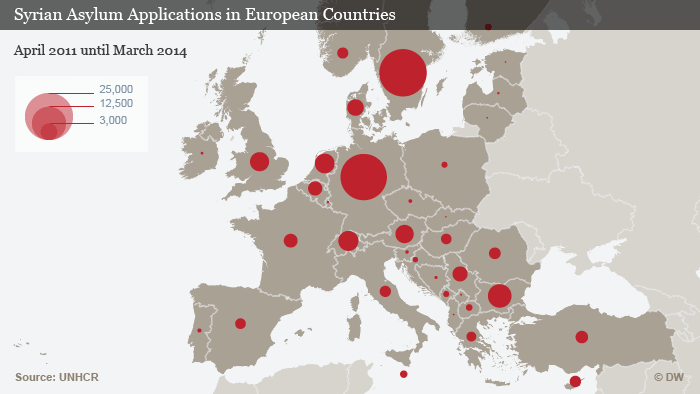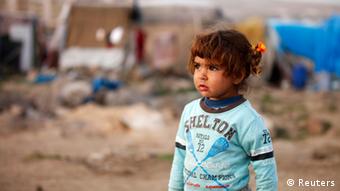The statistics are sobering: In just over three years of violent
conflict, nine million Syrians have been forced to flee their homes.
Around two thirds remain within the fractured state, while somewhere
between two and a half to three million are eking out an existence in
neighboring countries. Fewer than 100,000 have found safety in Europe.
The figure is glaringly at odds with EU rhetoric on human rights and its advocated approach to the refugee crisis. A Commission document published last month urged countries neighboring Syria to keep their borders open, "in line with international humanitarian law principles for the passage of all civilians without distinction."
Yet its own controlled and patrolled borders are virtually impenetrable. That those kept at bay are fleeing the horrors of a war triggered by the pursuit of the very democratic values supposedly upheld within the bloc’s bounds, reads like a bitter irony.
But Sherif Elsayed-Ali, Head of Refugee and Migrants’ Rights at Amnesty International, is not surprised by the bloc’s iron gates policy towards Syria’s displaced. "We have seen a lot of what the EU is doing to keep people from reaching Europe," he told DW. "They are very good at physically closing off their borders and preventing people from leaving the country they are in."
Boats not fit for sea
In a troublingly Kafkaesque system, anyone wishing to apply for asylum within the union must first reach EU soil. From Syria, the main routes to the mighty fortress take refugees through Turkey to the land borders with Greece or Bulgaria, or see them pay through the nose to board overcrowded and all too often unsafe boats from Libya and Egypt to Italy.
Neither option comes with a guarantee. On the contrary. Elsayed-Ali says Amnesty International has recorded increased patrols, equipment and personnel along Bulgaria’s outer border, as well as Greek coast guards who routinely intercept boats from Turkey and turn them away.
"Over the past year and a half, we have documented a lot of cases of people who told us they were pushed back to the Turkish side in boats with holes in them, increasing the danger of drowning."
The only positive, he says, is the recent advent of operation Mare Nostrum, in which the Italian navy, coast guard and private vessels intercept and rescue boats laden with refugees. This past weekend alone as many as 3,000 people, largely Syrians, were picked up and taken to safety.
Facing up to reality
But even if they do get lucky - and hundreds don’t - they risk their lives trying to reach a region of the world where, to all intents and purposes, they are not welcome. As if three years of profound reticence were not message enough, EU voters drove it home with a vengeance when they flaunted their anti-immigration sentiment at the polls in May.
Add to that concerns over terrorism, says Myriam Benraad, Middle East expert with the European Council on Foreign Relations (ECFR), and the prospect of the EU as a safe house for refugees becomes even more remote.
"A lot of EU member states are afraid of welcoming possible elements of the rebellion and all that it would entail in terms of security and politicization," she said.
Yet for all that, the refugee problem is not going to go away, and as Syria’s neighbors struggle to accommodate them, the pressure will mount on the EU to step up to the plate. Andreas Kamm, Secretary General of the Danish Refugee Council, says EU politicians have to grow wise to the realities of the situation and tackle it before it gets any worse.
"They have this idea that nine million Syrians want to come to Europe, but that is not the situation," he said, adding that most just desperately want to go home. "But if the conflict is not solved, they’re going to need an alternative, and we are going to have to come up with some solutions."
Border protection vs. human protection
The big question seems to be how the EU can make border protection and refugee protection mutually inclusive. Kamm sees the answer in the introduction of a wide-reaching resettlement program for the most vulnerable, which would not, he says, take more than a matter of minutes to put in place if the political will were behind it.
But in the immediate absence thereof, he is hoping to see more countries take their cue from Germany, which a foreign ministry spokesperson told DW has accepted almost 40,000 asylum applications from Syrians since 2011. By contrast the UK has welcomed less than 2,000. And France, fewer still.
"In my view Germany is trying to demonstrate responsibility," Kamm said. "And if other countries did the same, it would be a big help and would send a strong signal to the refugees."
Too little too late
Benraad, however, says it is too late for signals. When the revolutionary spirit caught fire in the Middle East in 2011, there were great expectations of Europe, not only because of historical ties, but because the countries in it embodied universal values of human rights and democracy.
Three years into a war that has killed as many as 160,000, and driven millions from their homes and their lives, the picture is very different.
Although she stops short of speaking in terms of an EU-MENA divorce, Benraad says there is a great sense of disappointment across the region, and that hopes have been dashed severely enough to put Europe out of the collective mindset, both for the present and the near future.
"I don't believe there is a single serious discussion going on between member states with regard to Syria," she said. "So I don’t think there are many expectations for greater EU involvement in helping find a solution or compromise."
Tamsin Walker
http://www.dw.de/how-europe-is-failing-syrias-refugees/a-17676844
The figure is glaringly at odds with EU rhetoric on human rights and its advocated approach to the refugee crisis. A Commission document published last month urged countries neighboring Syria to keep their borders open, "in line with international humanitarian law principles for the passage of all civilians without distinction."
Yet its own controlled and patrolled borders are virtually impenetrable. That those kept at bay are fleeing the horrors of a war triggered by the pursuit of the very democratic values supposedly upheld within the bloc’s bounds, reads like a bitter irony.
But Sherif Elsayed-Ali, Head of Refugee and Migrants’ Rights at Amnesty International, is not surprised by the bloc’s iron gates policy towards Syria’s displaced. "We have seen a lot of what the EU is doing to keep people from reaching Europe," he told DW. "They are very good at physically closing off their borders and preventing people from leaving the country they are in."
Boats not fit for sea
In a troublingly Kafkaesque system, anyone wishing to apply for asylum within the union must first reach EU soil. From Syria, the main routes to the mighty fortress take refugees through Turkey to the land borders with Greece or Bulgaria, or see them pay through the nose to board overcrowded and all too often unsafe boats from Libya and Egypt to Italy.
Neither option comes with a guarantee. On the contrary. Elsayed-Ali says Amnesty International has recorded increased patrols, equipment and personnel along Bulgaria’s outer border, as well as Greek coast guards who routinely intercept boats from Turkey and turn them away.
"Over the past year and a half, we have documented a lot of cases of people who told us they were pushed back to the Turkish side in boats with holes in them, increasing the danger of drowning."
The only positive, he says, is the recent advent of operation Mare Nostrum, in which the Italian navy, coast guard and private vessels intercept and rescue boats laden with refugees. This past weekend alone as many as 3,000 people, largely Syrians, were picked up and taken to safety.
Facing up to reality
But even if they do get lucky - and hundreds don’t - they risk their lives trying to reach a region of the world where, to all intents and purposes, they are not welcome. As if three years of profound reticence were not message enough, EU voters drove it home with a vengeance when they flaunted their anti-immigration sentiment at the polls in May.
Add to that concerns over terrorism, says Myriam Benraad, Middle East expert with the European Council on Foreign Relations (ECFR), and the prospect of the EU as a safe house for refugees becomes even more remote.
"A lot of EU member states are afraid of welcoming possible elements of the rebellion and all that it would entail in terms of security and politicization," she said.
Yet for all that, the refugee problem is not going to go away, and as Syria’s neighbors struggle to accommodate them, the pressure will mount on the EU to step up to the plate. Andreas Kamm, Secretary General of the Danish Refugee Council, says EU politicians have to grow wise to the realities of the situation and tackle it before it gets any worse.
"They have this idea that nine million Syrians want to come to Europe, but that is not the situation," he said, adding that most just desperately want to go home. "But if the conflict is not solved, they’re going to need an alternative, and we are going to have to come up with some solutions."
Border protection vs. human protection
The big question seems to be how the EU can make border protection and refugee protection mutually inclusive. Kamm sees the answer in the introduction of a wide-reaching resettlement program for the most vulnerable, which would not, he says, take more than a matter of minutes to put in place if the political will were behind it.
But in the immediate absence thereof, he is hoping to see more countries take their cue from Germany, which a foreign ministry spokesperson told DW has accepted almost 40,000 asylum applications from Syrians since 2011. By contrast the UK has welcomed less than 2,000. And France, fewer still.
"In my view Germany is trying to demonstrate responsibility," Kamm said. "And if other countries did the same, it would be a big help and would send a strong signal to the refugees."
Too little too late
Benraad, however, says it is too late for signals. When the revolutionary spirit caught fire in the Middle East in 2011, there were great expectations of Europe, not only because of historical ties, but because the countries in it embodied universal values of human rights and democracy.
Three years into a war that has killed as many as 160,000, and driven millions from their homes and their lives, the picture is very different.
Although she stops short of speaking in terms of an EU-MENA divorce, Benraad says there is a great sense of disappointment across the region, and that hopes have been dashed severely enough to put Europe out of the collective mindset, both for the present and the near future.
"I don't believe there is a single serious discussion going on between member states with regard to Syria," she said. "So I don’t think there are many expectations for greater EU involvement in helping find a solution or compromise."
Tamsin Walker
http://www.dw.de/how-europe-is-failing-syrias-refugees/a-17676844




No comments:
Post a Comment